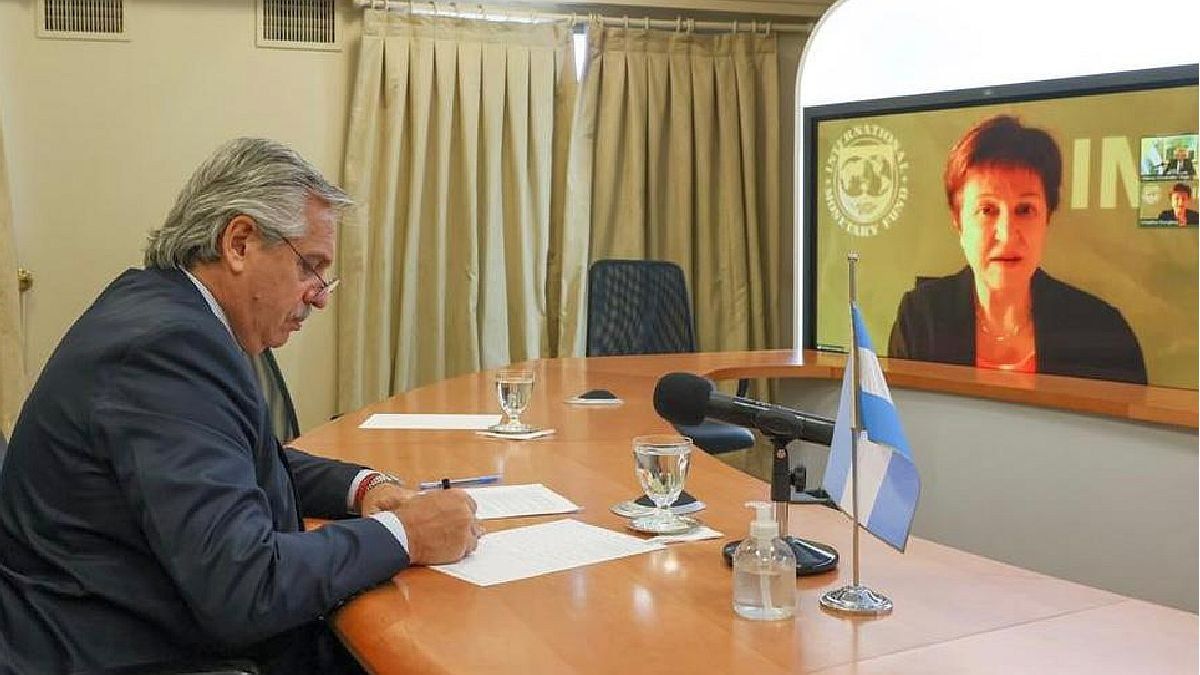The weakened reserves of the Central Bank will be reinforced with the disbursement “immediate disbursement of USD 9,650 million (7,000 SDR)” according to the official communication while indicating that the Board of Directors stated that “the program aims to improve public finances and reduce inflation”-
This year’s dollars will be provided by the IMF and the rest of the multilateral and bilateral international organizations (IFI).
“Although the IMF’s SDRs should be subtracted from gross reserves, since they do not constitute net reserves, the organization is making an exception with the 3,166 million SDRs that it will deliver this year (about US$4,385 million) as “budget support” to finance part of the fiscal deficit”, Explain Nadin Arganaraz.
The official communication of the Presidency of the Nation indicates “what The Argentine program supported by the IMF establishes pragmatic and realistic objectives, along with credible policies to strengthen macroeconomic stability and begin to address Argentina’s deep-seated challenges.”
The objective of the new loan is to “improve public finances and begin to reduce persistent high inflation through a multiple strategy, which implies a gradual elimination of monetary financing of the fiscal deficit and improvements in the monetary policy framework” With these concepts the notification of the Argentine authorities ends.
The IMF version
Meanwhile, the IMF, several hours after the Board meeting ended, issued an extensive statement indicating the approval of the “30-month extended agreement under the Extended Fund Facility (EFF) for Argentina for SDR 31.914 billion (equivalent to US$44 billion or 1000 percent of the quota” and likewise “concluded the 2022 Article IV Consultation.” While guaranteeing that it will be carried out “an immediate disbursement of SDR 7,000 million, equivalent to US$9,656 million”.
Like the Argentine statement, the IMF states that “the EFF agreement aims to provide Argentina with balance of payments and budget support backed by measures designed to strengthen debt sustainability, address high inflation, increase reserves, address social and infrastructure gaps in the country and promote inclusive growth.
He remarks that “the authorities’ program backed by the IMF, which was recently approved by the Argentine National Congress, aims to strengthen public finances and begin to reduce persistently high inflation through a multi-pronged strategy involving the gradual elimination of monetary financing of the fiscal deficit and an improved monetary and exchange rate policy framework”.
It also indicates that the “The program also contemplates measures to strengthen the debt market in pesos, the effectiveness of public spending, labor and gender inclusion, and the competitiveness of key sectors.”.
Consensus
After the meeting, the head of the IMF Kristalina GeorgievCEO and President, stated:
- “While an economic and employment recovery is underway, Argentina continues to face exceptional economic and social challenges, including depressed per capita income, high levels of poverty, persistently high inflation, a heavy debt burden and low external buffers.
- In this context, the authorities’ economic program sets pragmatic and realistic goalsalong with credible policies to strengthen macroeconomic stability and begin to address Argentina’s deep-seated challenges.
- It highlights that there were “significant financial commitments obtained from Argentina’s international partners that will support the authorities’ reform efforts and improve the country’s external defenses.
- A strong political and social consensus is key to sustaining the implementation of the reform agenda, even in the medium term.
- The program contains a carefully calibrated set of economic policies. Sustained, growth-friendly fiscal consolidation will strengthen debt sustainability and allow monetary financing to be removed from the fiscal deficit, helping to begin to address persistently high inflation.
- In addition, an improved monetary and exchange framework that generates positive real interest rates and a competitive real exchange rate will help support demand for peso assets and improve reserve coverage.
- These actions will help pave the way for a possible relaxation of exchange controls based on conditions.
- It is important to note that the program includes policies to strengthen the debt market in domestic pesos, improve the effectiveness and transparency of public spending, promote labor and gender inclusion, and improve the sustainability and efficiency of key sectors.
- The risks to the program are exceptionally high and the fallout from the war in Ukraine is already materializing..
- In this context, Early recalibration of the program, including identifying and taking appropriate action as needed, will be critical to achieving program goals.”
Executive Board Evaluation
The statement also informs about the consideration of the executive directors who: “widely agreed with the central idea of the staff evaluation” (staff).
The statement indicates that they took into account “the fragile economic, financial and social situation in Argentina, which has been aggravated by the pandemic and, more recently, by the collateral effects of the war in Ukraine”.
For these reasons Directors supported the Argentine authorities’ request for an Expanded Agreement under the Expanded Fund of the Fund
Officials noted that “Strong ownership, as well as sustained and firm implementation of the authorities’ program, will be critical to strengthening economic stability and beginning to address Argentina’s deep-seated challenges.”
They also emphasized that “A credible, sustained, growth-friendly fiscal consolidation is key to strengthening debt sustainability and discontinuing monetary financing of the fiscal deficit.”
They emphasized the need to improve the efficiency, equity and compliance of the tax system.
The issue of public spending was mentioned since the executives of the Board of Directors requested “They called for improvements in the structure of spending, including reducing costly and untargeted energy subsidies, while expanding infrastructure spending.
They also warned about need to protect well-targeted social assistance programs and prudent management of salaries and pensions.
Inflation
The directory underlined: “the critical importance of reducing persistently high inflation and rebuilding international reserves.
In this sense they emphasizedthe importance of ending monetary financing and implementing the improved monetary policy framework to generate positive real interest rates and encourage demand for pesos.
Exchange rate
In this point “highlighted the importance of maintaining a competitive real exchange rate and adapting the capital flow management frameworkalthough they clarified that “in time and as conditions permit, to ensure trade surpluses, encourage long-term inflows and boost the accumulation of reserves, which would allow an eventual return to international markets.
Structural reforms
The board raised the need to advance in structural reforms that “address Argentina’s longstanding structural vulnerabilities.”
At this point they highlighted:
- The importance of strengthening the debt market in domestic pesos;
- Improve the sustainability and efficiency of key sectors, including energy; and promote labor and gender inclusion.
- Strengthen the investment climate by gradually eliminating economic distortions and providing a more predictable regulatory framework, including in strategic sectors.
- Improve governance, including boosting the efficiency and transparency of public spending and strengthening the AML/CFT regime.
risks
The board agreed that “The program is subject to exceptionally high risks.”
In this sense, they recognized Argentina’s vulnerability to external shocks and implementation difficulties given the complex social and political situation.
Revision
Noting that “the secondary effects of the war in Ukraine are materializing, the directors welcomed the authorities agreed to bring forward the first review of the program and urged them to recalibrate policies, as necessary, to ensure fiscal objectives and contain the inflationary effects of the second round of rising commodity prices.”
Reputation
The directors noted that high exposure to Argentina over an extended period creates significant financial and reputational risks for the Fund.
Since these risks cannot be fully mitigated through program design and contingency planning, directors agreed that Finely balanced judgments will be needed in assessing the difficult trade-offs likely to emerge during the life of the program.
They also agreed that beyond the program period, further efforts will be required to build stability and address long-standing structural challenges.
In particular, they agreed that, in the medium term, “Argentina will need to further strengthen debt sustainability, bolster the Central Bank’s balance sheet and governance framework, and address regulatory barriers to productivity, investment, and formal employment.” (that is, structural reforms such as labor)
And, some directors “called on the authorities to incorporate some of these reforms into the current program to increase its credibility.”
Source: Ambito
David William is a talented author who has made a name for himself in the world of writing. He is a professional author who writes on a wide range of topics, from general interest to opinion news. David is currently working as a writer at 24 hours worlds where he brings his unique perspective and in-depth research to his articles, making them both informative and engaging.




